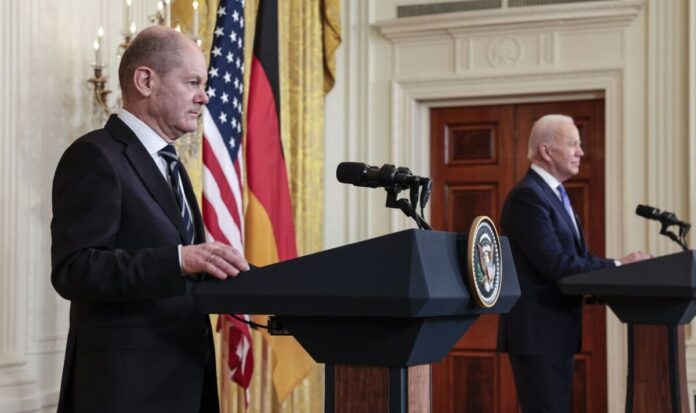German Chancellor Olaf Scholz speaking during a visit to Singapore that his country wants to strengthen its economic ties with the Asia-Pacific region, emphasising that it is ‘far more than just China.”Mr Scholz was in Singapore on the second leg of an Asian trip that started in Vietnam and also will take him to the summit in Bali, Indonesia, of the Group of 20 global powers. The journey follows a visit to Beijing earlier this month and comes as Germany grapples with its future trade and political relationship with China.’Of course China remains an important business and trade partner,’ Chancellor Scholz said in a speech to the Asia-Pacific Conference of German Business on Monday. But, he said, ‘the Asia-Pacific region encompasses far more than just China.”‘My message is that Germany is very interested in strengthening its economic connections with your region,’ he said.Chinese investments in Germany have been in focus in recent weeks as officials seek to balance strong business relations with a desire to avoid repeating mistakes made with Russia, which once supplied more than half of Germany’s natural gas and now supplies none. Biden and Scholz are on a collision course over China, says former US ambassador to NATO (Image: Getty) Olaf Scholz visited Xi Jinping in Beijing last week (Image: Getty)Mr Scholz is encouraging German companies to diversify but is not discouraging business with China.He said Monday that Germany’s political and economic position must reflect the fact that today’s China is very different from the China of five or 10 years ago, and that Germany’s political and economic position must reflect that. A new national security strategy will emphasise ‘reducing risky one-sided dependencies regarding certain raw materials or critical technology,’ he added.But Scholz said that ‘diversification does not mean uncoupling.”But the German Chancellor’s approach to Beijing might see him “headed for a collision” with US President Joe Biden, according to Ivo Daalder, former US ambassador to NATO.READ MORE: NATO to hold emergency talks to discuss Poland triggering Article 4Writing in Politico, he warnedL “When it comes to China, there are stark differences between the the U.S. and Germany, and notably between Scholz and Biden. And these concern three core issues – the nature of China under Xi, the drivers of global politics and the extent of economic partnership with China.”[…] Scholz noted that after the Party Congress’ avowed display of Marxism-Leninism, the ‘quest for national security – synonymous with the stability of the communist system – and national autonomy will be more significant going forward’.”But it won’t just be more significant – the power of the communist party and system over China is at the very core of Xi’s unrivalled rule. China under Xi is no longer a country that aims to grow economically and bring hundreds of millions of its people out of poverty, nor is it still satisfied to follow Deng Xiaoping’s dictum that China ‘hide its strengths, bide its time’.”Rather, it is a country seeking to overhaul the international system. As former Australian Prime Minister Kevin Rudd observes, China’s president wants an international system ‘anchored in Chinese rather than American power and one that reflects norms more consistent with Marxist-Leninist values’ rather than Western values.DON’T MISS:Russia caused ‘diversion’ for the West by attack on Poland [INSIGHT]Deadly missile attack in Poland may be from Ukraine, US official says [VIDEO]Sunak clears schedule for emergency meeting over Poland missile [ANALYSIS]”This is also Biden’s view. His National Security Strategy states that the People’s Republic of China is ‘the only competitor with both the intent to reshape the international order and, increasingly, the economic, diplomatic, military, and technological power to do it.'”These different points of view on Xi’s ambitions for China are also compounded by Scholz and Biden’s diverging views on what drives international politics today. For Scholz, the central force of change in global politics is the emergence of ‘new centres of power…in a multipolar world.’ And Germany’s goal is to build partnerships with all these powers to deal with the globe’s growing challenges.”Biden doesn’t deny the prevalence of these global challenges, such as climate change and pandemics or the need to find ways of cooperating with others – including competitors like China – in order to better respond to them. But his view of today’s world isn’t of a multipolar one. Instead, he sees a China determined to overhaul the rules-based international order that has benefited countries around the world for decades – not least the leading Western powers in North America, Europe and Asia.”That’s why he believes strategic competition is now the driving force of international politics.”
China tests Western allies as Scholz and Biden ‘headed for collision’
Sourceexpress.co.uk
RELATED ARTICLES


